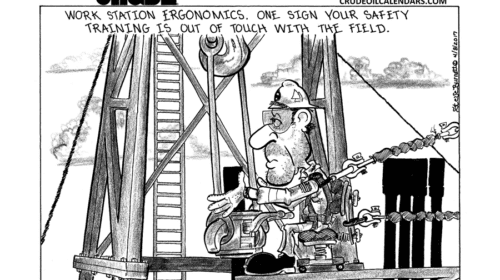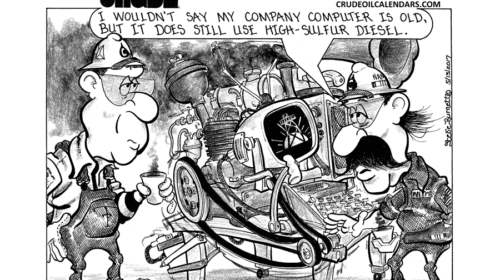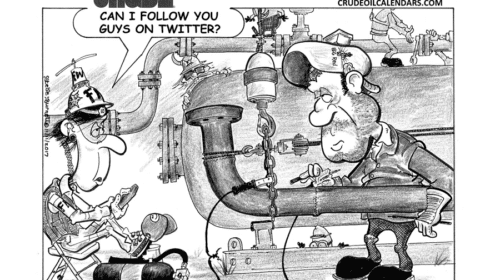
While most people are familiar with my night job as the cartoonist for CRUDE Calendars, the majority of my connections are not familiar with my day job at North Central Texas College in the Petroleum Technology Program as the Department Chair on the Bowie Campus. I want to add some insight into how I believe you can prepare to move from the exploration to the production end of the petroleum business. The reason to move from the exploration end to the production end is simply due to the stability of the production end.
In case you have not noticed, most of the layoffs in the current oil price downturn are on the exploration end. If you have some experience with the exploration end then that makes you a stronger candidate for the production end. However, due to the “Great Crew Change” most exploration and production (E&P) companies are now requiring you to have a college degree, regardless of how much experience you have on the E end of it.
The reason for this new change in hiring practices is the fact that when the Great Crew Change takes place, the E&P companies need college educated employees to move up to take over the management positions.
I survived the $11 per barrel in 1986 working on the production end of Pennzoil’s E&P in the Gulf of Mexico. I had two brothers and my father also working in the oilfields at the time. My oldest brother was the QC manager at a manufacturing plant in Oklahoma City. While he was not working in the field, the products that his company produced supported the drilling industry. His job did not survive the downturn.
My other brother was the field technician for a major E&P in West Texas, and his job did survive the price drop. My father was an assistant production foreman for a different major E&P in West Texas, and his job did not survive the crunch.
There are some who would say he did survive since he retired with a severance package. He may not have been laid off like most, but make no mistake about it, his job was cut. Since he had 37 years with the company, he was offered the package. What most people do not realize is that in his case, as in most severance packages, the option is put to the employee that, “this is a one-time offer and we cannot guarantee your job if you do not take it.”
My dad also did not have a college degree. While it was never mentioned as a qualifying reason that he lost his job when others did not, it has always been a point for me. For example, I went to high school with a guy who became an assistant production foreman with the same company my dad was working for. My former classmate kept his job after the downturn. He also had an associate degree in petroleum technology.
My former classmate is now working in the corporate headquarters in Houston for the same company. The only reason my older brother and myself did not lose our jobs was the fact that we worked in the field on the P end. I am convinced the reason my dad lost his position was the fact that he was in a management position without a college degree, even though he was in the P end. In 1986, when the price of oil hit $11, there were major layoffs in the industry and most of those were on the E end
of E&P.
Since 2011, I have been on the NCTC Petroleum Technology Campus in Bowie. We have graduated about 100 students. The majority of the students do not go to work on the E end of E&P. Most of them go to work as pumpers for E&P companies. Some of the E&P companies the students work for are Chevron, The Hunt Oil Company, EOG, Devon, Murphy, and ConocoPhillips.
NCTC Petroleum Technology is not a pumper’s school, but that is where most of the students end up employed. And 12% of the students are women, while 38% of the students are minorities. Every semester, the introduction to petroleum class is filled with students who move from all over the U.S. and several different countries to take the NCTC Petroleum Technology Program.
The high pumper/operator employment rate could be related to a couple of facts. First, the average age of NCTC Petroleum Technology students is 38 (maybe too old to start out in drilling). Second, it could be that my 20 years in the oilfield is primarily in production (so my instructing slant is towards production).
NCTC Petroleum Technology on the Bowie Campus has an 85% industry employment rate. I will mention here that of the 15% that do not find employment in the industry, most have turned down jobs simply because they are unwilling to relocate. I will also mention that I am not an engineer, and NCTC Petroleum Technology is not an engineer school.
As most of you know I am a cartoonist, so my degrees are in Art BFA, and Education Administration MEd. While none of the classes will transfer to an engineer school, the whole program will transfer to several universities in their BAAS program. These are great programs to transfer to and upgrade your value as an employee in the petroleum industry.
For example, The University of North Texas will accept all the classes from your Petroleum Technology Associate Degree and use them towards a BAAS Bachelor Degree in Emergency Administration and Planning in the Petroleum Industry or the Business Management Petroleum Industry. After you have a Bachelor Degree in the Petroleum Industry, if you are ambitious, you can take the University of Tulsa’s online Master’s Program in Petroleum Law.
My contacts with the major E&P companies are informing me that they still want prospective employees to have a college degree, regardless of how much experience they have in the E end of the business.
I mentioned the exploration experience makes you a better production candidate when you add the college degree. For example one of the NCTC Petroleum Technology graduates had experience on a work-over rig. He was able to utilize that experience with his degree to move into a completions foreman position with the E&P company within two years after graduating from NCTC.
My suggestion is that if you find yourself “on vacation” from the oilfield, whether it is by choice or not, raise your value to the petroleum industry and acquire a more secure position that will allow you to survive the downturns. As much as we all hate to admit it, the ups and downs will always be part of the beast of the industry. When you upgrade with a college degree, even if it is a two-year associate degree, you open up a wide range of new opportunities for your future in the petroleum industry. If you get a degree and work a few years on the P end, it will open up more doors for you to move back to the E end when the price of oil kicks back up.
We had a “vacationing” MWD hand, John Blackwood, visit the school. He said he went to bed on drilling location Dec. 11 with a job, and woke up on Dec. 12 unemployed. He is currently scrambling around trying to locate a job in the industry. He gave the class two points of advice: stay in the program to get the degree, and go into production.
If you find yourself “on vacation” from the oilfield, give me call and chat with me about the cruise program to the P end of E&P. You can read about the program and classes at nctc.edu. Look under Technical Programs. My contact information is: sburnett@nctc.edu, or 940 872 4002 ext. 5219.
May your boots be dry, your coffee fresh, and your gloves new. Kybree.
Steve Burnett | www.crudeoilcalendars.com
Steve Burnett has been working in the oil industry since the age of 16. He started out working construction on a pipeline crew and after retirement, finishes his career as a Pipeline Safety Compliance Inspector. He has a degree in art and watched oil and art collide in his career to form the “Crude Oil Calendars.” He also taught in the same two fields and believes that while technology has advanced, the valuable people at the core of the industry and the attributes they encompass, remain the same. With a humorist for a father, he also learned that a dose of comedy makes everything better. The major influences on his cartooning style were the Ace Reid Cowpokes cartoons, the Dirk West sports cartoons and V.T. Hamlin's Alley Oop comic.













